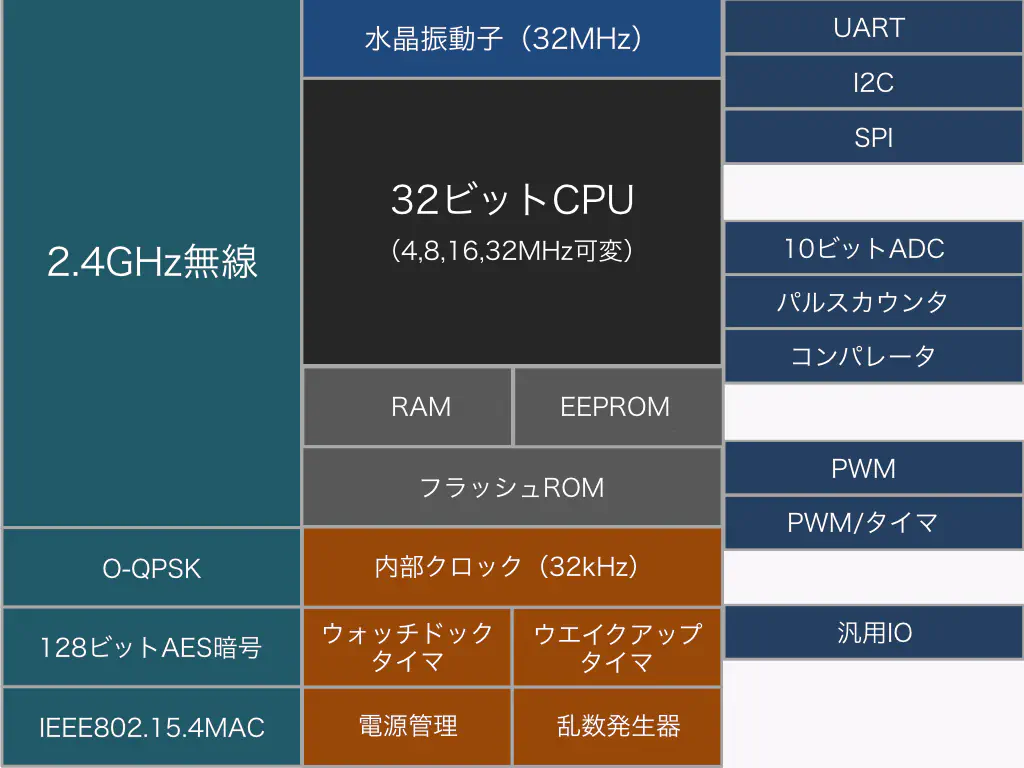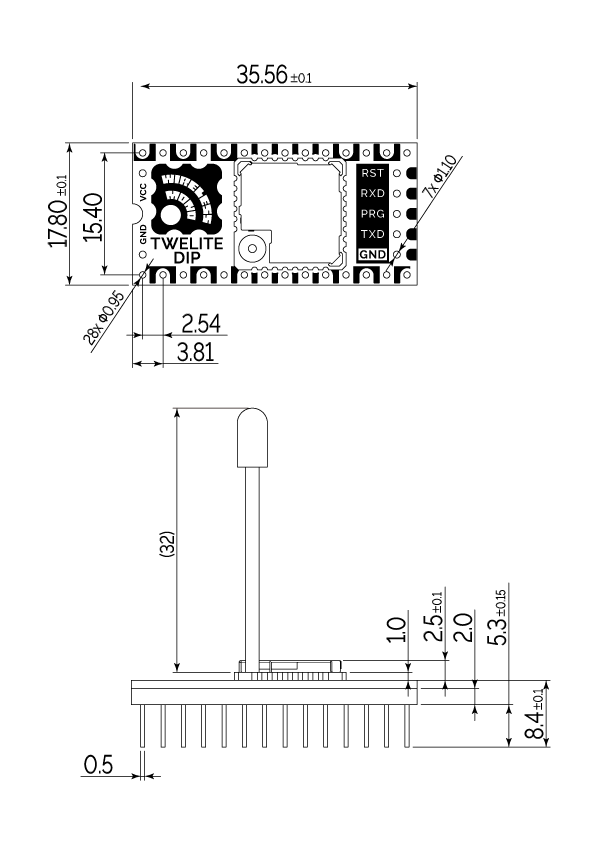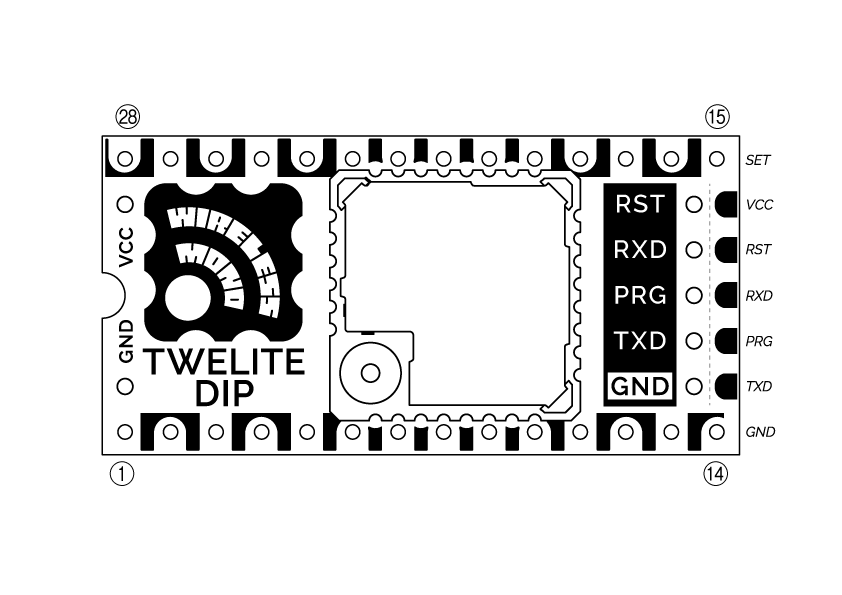TWELITE DIP Wireless Microcontroller Datasheet
TWELITE DIP BLUE (Certification Model: TWE-001 Lite) / TWELITE DIP RED (Certification Model: TWELITE RED) are TWELITE modules in an easy-to-handle DIP format. They feature an ultra-low power and high-performance microcontroller, flash memory, and a high-performance IEEE802.15.4-compliant wireless transceiver.
By connecting power and sensors and storing programs in flash memory or EEPROM, the module can be operated.
Supports SPI, I2C, and UART, allowing connection to various sensors and microcontrollers.
Certified for use in Japan, making it ready for immediate productization.
Features
- Compliant with the globally standardized IEEE802.15.4
- Proprietary protocol stack “TWELITE NET” available
- 2.54mm pitch, 28-pin (600mil) DIP IC form factor
- Stable long-distance communication enabled by board design maximizing chip performance
- Equipped with 32KB RAM and 160KB/512KB flash memory for high-performance communication applications
- Standby current is as low as 0.1μA (RAMOFF sleep), contributing to long battery life
- Rich I/O including 4 or 6 AD converters, 1 comparator, and 20 GPIOs enables direct sensor connection
- Firmware can be modified thanks to onboard flash memory
- Firmware development supported by free GNU-based development environment
- Secure communication enabled via powerful 128-bit AES encryption
- Certified under Japan’s ARIB STD-T66 (technical compliance), allowing use without licensing or additional applications
- RoHS compliant, meeting new environmental standards
Specifications
Product Variations
TWELITE DIP BLUE and TWELITE DIP RED come in the variations listed below. Please select the most suitable one for your application.
Sales codes are subject to change. Please refer to our website for the latest codes.
| TWELITE Name | Sales Code | Antenna | Remarks |
|---|---|---|---|
| TWELITE DIP BLUE | TWE-L-DI-W | Matchstick Antenna Type | With Pin Headers |
| TWE-L-DP-W | Without Pin Headers | ||
| TWE-L-DI-U | Coaxial Connector Type | With Pin Headers, Antenna Sold Separately | |
| TWE-L-DP-U | Without Pin Headers, Antenna Sold Separately | ||
| TWELITE DIP RED | MW-R-DI-W | Matchstick Antenna Type | With Pin Headers |
| MW-R-DI-W | Without Pin Headers | ||
| MW-R-DI-U | Coaxial Connector Type | With Pin Headers, Antenna Sold Separately | |
| MW-R-DI-U | Without Pin Headers, Antenna Sold Separately |
Radio Section
| TWELITE DIP BLUE | TWELITE DIP RED | Remarks | |
|---|---|---|---|
| Communication Method | 2.4GHzCompliant with IEEE 802.15.4 | 2.4GHzCompliant with IEEE 802.15.4 | |
| Protocol Stack | TWELITE NET andIEEE 802.15.4 MAC | TWELITE NET andIEEE 802.15.4 MAC | |
| Communication Speed | Up to 250kbps | Up to 250kbps | |
| Modulation Method | O-QPSK, DSSS | O-QPSK, DSSS | |
| Number of Channels | 16 | 16 | May vary by country |
| Transmit Power | 2.5dBm | 9.19dBm | 25℃,3V |
| Receiver Sensitivity | -95dBm | -96dBm | 25℃,3V,typ |
| Transmit Current | 15.3mA | 23.3mA | 25℃,3V,typ At max output |
| - | 14.0mA | At 3dBm output | |
| Receive Current | 17.0mA | 14.7mA | 25℃,3V,typ |
Microcontroller Section
- 32-bit RISC processor
- Variable clock enables optimized power consumption
- RAM: 32kBytes
- EEPROM: 4kBytes
- Flash memory: 160kBytes (TWELITE DIP BLUE), 512kBytes (TWELITE DIP RED)
- Watchdog timer, brown-out detection
- Fine-grained power control per block (Digital/Analog/RAM/Wireless)
- Built-in AES 128-bit encryption circuit and 16-bit random number generator
Interfaces
| Qty | Remarks | |
|---|---|---|
| ADC | 4/6 | 10bit. 4 ports for TWELITE BLUE, 6 ports for TWELITE RED |
| PWM | 4 | |
| Timer/PWM | 1 | 5 modes including PWM, Δ∑. 16MHz, 16-bit precision |
| Pulse Counter | 2 | Operates in sleep mode. Up to 100kHz, 16-bit |
| UART | 2 | 16550A compatible |
| SPIMaster/Slave | 1 | 3 chip selects, up to 16MHz |
| Comparator | 1 | |
| 2-wire SerialMaster/Slave(I2C, SMBUS compatible) | 1 | Up to 100kHz or 400kHz, 7/10bit address mode |
| General-purpose Digital | 20 | Shared with other I/F |
- Many pins are shared; availability depends on usage combinations.
Certifications and Regulatory
| TWELITE DIP BLUE | TWELITE DIP RED | |
|---|---|---|
| Certification Model | TWE-001 Lite | TWELITE RED |
| Technical Conformity Certification Number | 007-AB0031 | 007-AF0062 |
| FCC ID | 2AINN-L1 | - |
| IC ID | 21544-L1 | - |
| Remarks | RoHS Compliant | RoHS Compliant |
*1. When using TWELITE overseas, please check with us early in development due to restrictions on antennas, etc.
*2. Some countries may require labeling of FCC ID or IC ID on TWELITE or products. Contact us if applicable.
Export Notes
- The built-in AES 128-bit encryption circuit in TWELITE is subject to export control classification. We will issue a classification document upon request.
- Depending on the country, products may not pass customs unless TWELITE has wireless certification. Please inquire for details.
Product Labeling
Product labels, certification numbers, etc., are printed on the device but may change without notice.
Block Diagram

Block diagram of TWELITE DIP series
Dimensions

External dimensions of TWE-L-DI-W
| Dimensions | Weight | Remarks |
|---|---|---|
| 35.56mm x 17.8mm x 3.5mm | 2.2g | Excluding antenna, connector, and terminals |
Pin Assignment
Pin Number

Pin Numbers and Assignments
The tail pads are compatible with the 7P interface of TWELITE R2/R3.
When soldering, be careful not to bridge the 5P through-hole next to the pad.
Pin Assignment
| #(*1) | IO Name (*2) | Function Assignment (*3) | Alternate Assignment (*4) | Feature Name in “Extremely Simple! Standard App” (*5) | ||||
|---|---|---|---|---|---|---|---|---|
| 1 | GND | GND | ||||||
| 2 | DIO14 | SIF_CLK | TXD1 | TXD0 | SPISEL1 | SCL | ||
| 3 | DIO7 | RXD0 | PWM3 | RX | ||||
| 4 | DIO5 | RTS0 | PWM1 | PC1 | PWM1 | |||
| 5 | DIO18 | SPIMOSI | DO1 | |||||
| 6 | DO0 | SPICLK | PWM2(*6) | PWM2 | ||||
| 7 | DO1 | SPIMISO | PWM3(*6) | PWM3 | ||||
| 8 | DIO19 | SPISEL0 | DO2 | |||||
| 9 | DIO4 | CTS0 | TIM0OUT | PC0 | DO3 | |||
| 10 | DIO6 | TXD0 | PWM2 | TX | ||||
| 11 | DIO8 | TIM0CK_GT | PC1 | PWM4 | PWM4 | |||
| 12 | DIO9 | TIM0CAP | 32KTALIN | RXD1 | DO4 | |||
| 13 | DIO10 | TIM0OUT | 32KTALOUT | M1 | ||||
| 14 | GND | GND | ||||||
| 15 | DIO12 | PWM2 | CTS0 | DI1 | ||||
| 16 | DIO13 | PWM3 | RTS0 | DI2 | ||||
| 17 | DIO11 | PWM1 | TXD1 | DI3 | ||||
| 18 | DIO16 | COMP1P | SIF_CLK | DI4 | ||||
| 19 | DIO15 | SIF_D | RXD1 | RXD0 | SPISEL2 | SDA | ||
| 20 | DIO17 | COMP1M | PWM4 | SIF_D | BPS | |||
| 21 | RESETN | RESETN | RST | |||||
| 22 | ADC1 | AI1 | ||||||
| 23 | DIO0 | SPISEL1 | ADC3 | AI2 | ||||
| 24 | ADC2 | VREF | AI3 | |||||
| 25 | DIO1 | SPISEL2 | ADC4 | PC0 | AI4 | |||
| 26 | DIO2 | ADC5(*7) | TIM0CK_GT | M2 | ||||
| 27 | DIO3 | ADC6(*7) | TIM0CAP | M3 | ||||
| 28 | VCC | VCC | VCC |
(*1) Pin number. The number and assignment of pins differ from TWELITE (SMD version). Usually, use the IO Name to specify pins.
(*2) Pin definition name. This is used in semiconductor datasheets and TWELITE app development; our technical support also refers to pins by their IO Name.
(*3) Each pin can be used as simple I/O or analog input, but you can assign other functions via API initialization. This table lists typical functions.
(*4) By initializing via API, you can move functions to alternate assignment pins. This table lists typical alternate functions.
(*5) Pin names specific to the “Extremely Simple! Standard App” (App_Twelite). These are similar to IO Names; take care not to confuse them.
(*6) PWM2,3 can be assigned to DO0,1 by releasing the assignment of DIO6,7 or DIO12,13.
(*7) ADC5 and ADC6 are available only on TWELITE RED.
Function Overview
| Signal Name | Function |
|---|---|
| PC | Pulse Counter |
| SPICLK | SPI Clock |
| SPISEL | SPI Select Output |
| SPIMISO | SPI Controller Input (SDI) |
| SPIMOSI | SPI Controller Output (SDO) |
| TIM0CK_GT | Timer Clock, Gate Input |
| TIM0CAP | Timer Capture Input |
| TIM0OUT | Timer PWM Output |
| 32KTALIN | Crystal Input |
| 32KTALOUT | Crystal Output |
| VREF | Reference Voltage |
| COMP1M | Comparator + Input |
| COMP1P | Comparator - Input |
| SIF_D | 2-wire Serial Data |
| SIF_CLK | 2-wire Serial Clock |
| RXD | UART RX |
| TXD | UART TX |
| RTS | UART RTS |
| CTS | UART CTS |
| PWM | Pulse Width Modulation Output |
Handling of Special Pins
DO0 (Function: SPICLK)
This pin is used as an output.
Applying voltage from external sources
(even with some output impedance) has been reported to cause the TWE module to not enter programming mode.
When connecting LEDs or transistors, the pin may enter an intermediate state upon startup or wake from sleep, potentially causing malfunction. We recommend configuring the external circuit so that it is always pulled up to Vcc.
DO1 (Function: SPIMISO)
This pin is often used as an output, but at module power-up or reset, it behaves as an input. If the voltage is judged as Low at that time, the module will start in programming mode. Pay attention to the voltage level at startup on this pin.
DIO0 (Function: ADC3), DIO1 (Function: ADC4)
These pins are shared with analog input. In firmware, the internal pull-up must be disabled when reading AD values .
ADC2
ADC2 can be used as a reference voltage input. Software implementation is required to use this. Note that there is no pin to output the reference voltage.
GND
It is recommended to connect both pins 1 and 14 to GND, but operation is possible with either unconnected. No significant change in wireless performance has been observed if one is left unconnected.
Absolute Maximum Ratings
| Min | Max | ||
|---|---|---|---|
| Power Supply (VCC) | -0.3 | 3.6 | V |
| Analog IO (VREF/ADC) | -0.3 | VCC+0.3 | V |
| Digital IO | -0.3 | VCC+0.3 | V |
Characteristics
Recommended Operating Conditions
| Symbol | Condition | min | typ | max | ||||
|---|---|---|---|---|---|---|---|---|
| Power Supply Voltage | VCC | 2.0 | 3.0 | 3.6 | V | |||
| Startup Voltage | Vboot | 2.05 | V | |||||
| Operating Temperature | TOPR | No condensation | TWELITE DIP BLUE | -40 | 25 | 105(*1) 90(*2) | ℃ | |
| TWELITE DIP RED | -30 | 25 | 90 | |||||
| Operating Humidity | HOPR | No condensation | 85 | %RH |
- Values are based on semiconductor datasheet.
*1 Max operating temperature of TWE-L-WX
*2 Max operating temperature of TWE-L-U
DC Characteristics
| Symbol | Condition | min | typ | max | |||
|---|---|---|---|---|---|---|---|
| Current Consumption | ICC | Sleep(RAMOFF, no timer) | TWELITE DIP BLUE | 0.1 | uA | ||
| TWELITE DIP RED | 0.1 | uA | |||||
| Sleep(with timer) | TWELITE DIP BLUE | 1.5 | uA | ||||
| TWELITE DIP RED | 1.5 | uA | |||||
| Transmit (CPU doze) | TWELITE DIP BLUE | 15.3 | mA | ||||
| TWELITE DIP RED | 23.3 | mA | |||||
| TWELITE DIP RED(at 3dBm output) | 14.0 | mA | |||||
| Receive (CPU doze) | TWELITE DIP BLUE | 17.0 | mA | ||||
| TWELITE DIP RED | 14.7 | mA | |||||
| Transmit Power | Pout | TWELITE DIP BLUE | +0.5 | 2.5 | dBm | ||
| TWELITE DIP RED | 9.14 | dBm | |||||
| Receiver Sensitivity | TWELITE DIP BLUE | -95 | dBm | ||||
| TWELITE DIP RED | -96 | dBm |
- Values are based on semiconductor datasheet.
I/O Characteristics
| Symbol | Condition | min | typ | max | ||
|---|---|---|---|---|---|---|
| Internal Pull-up on DIO | 40 | 50 | 60 | kΩ | ||
| DIO High Input | VIH | VCCx0.7 | VCC | V | ||
| DIO Low Input | VIL | -0.3 | VCCx0.27 | V | ||
| DIO Input Hysteresis | 200 | 310 | 400 | mV | ||
| DIO High Output | VOH | TWELITE DIP BLUE | VCCx0.8 | VCC | V | |
| TWELITE DIP RED | VCC-0.4 | |||||
| DIO Low Output | VOL | 0 | 0.4 | V | ||
| DIO Load, Sink Current | IOL | VCC 2.7~3.6V | 4 | mA | ||
| VCC 2.2~2.7V | 3 | mA | ||||
| VCC 2.0~2.2V | 2.5 | mA |
- Values are based on semiconductor datasheet.
ADC Characteristics
| Symbol | Condition | min | typ | max | ||
|---|---|---|---|---|---|---|
| Reference Voltage | VREF | 1.198 | 1.235 | 1.260 | V | |
| ADC Resolution | 10 | Bits | ||||
| ADC Integral Nonlinearity | ±1.6, ±1.8 | LSB | ||||
| ADC Differential Nonlinearity | -0.5 | 0.5 | LSB | |||
| ADC Offset Error | 0~VREF | -10 | mV | |||
| 0~2VREF | -20 | |||||
| ADC Gain Error | TWELITE DIP BLUE0~VREF | +10 | mV | |||
| TWELITE DIP BLUE0~2VREF | +20 | |||||
| TWELITE DIP RED0~VREF | -10 | |||||
| TWELITE DIP RED0~2VREF | -20 | |||||
| ADC Clock | 0.25,0.5, 1.0 | MHz | ||||
| ADC Input Range | 0.04 | VREF2xVREF | V |
- Values are based on semiconductor datasheet.
Precautions for Use
Storage
Avoid high temperature and humidity. Use the product within six months of delivery.
General Notes
Please be sure to evaluate and verify the product in your actual usage environment.
For applications requiring high reliability or involving human safety, please consult with your distributor in advance.
Revision History
| Version | Revision Date | Revision Details |
|---|---|---|
| 2.0.1 | 2024/11/12 | Corrected unit mislabeling for current consumption |
| 2.0.0 | 2024/07/12 | Updated due to PCB design change |
| 1.1.1 | 2024/03/04 | Corrected annotation in pin assignment table |
| 1.1.0 | 2024/02/27 | Migrated to new website |
| 1.0.2 | 2018/11/5 | Added explanation for Table 6 |
| 1.0.1 | 2018/3/13 | Corrected errors in pin assignment table |
| 1.0.0 | 2018/2/6 | Initial version |